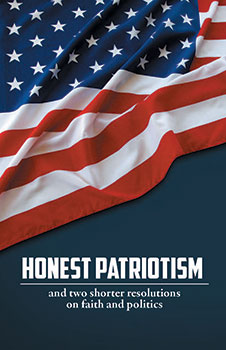November 7, 2023
What responsibilities do we as the church, then, have to our government? … We owe the government our intercession, our active participation and our prophetic critique.—Honest Patriotism, 13
 Church and state. Faith and politics. Religion and government. What a charged “and” links these oft-contested realities. Amid such flurried contests of identity, borders, meaning and structure, what do intercessory prayers, active participation and prophetic critique look like? How, when so many institutions — political, cultural and religious — appear to be fraying at the edges, are we to pray, participate, and critique in ways that heal and transform? These are pressing queries that resist simple answers. And yet perhaps a partial answer rests in the realization that there are numerous ways to engage in the life of faith and the civic realm.
Church and state. Faith and politics. Religion and government. What a charged “and” links these oft-contested realities. Amid such flurried contests of identity, borders, meaning and structure, what do intercessory prayers, active participation and prophetic critique look like? How, when so many institutions — political, cultural and religious — appear to be fraying at the edges, are we to pray, participate, and critique in ways that heal and transform? These are pressing queries that resist simple answers. And yet perhaps a partial answer rests in the realization that there are numerous ways to engage in the life of faith and the civic realm.
We pray, therefore, neither as perfunctory nor perfect act, but as an expression of trust in God. We pray as loving response to and in hope-filled anticipation of God’s guidance. There is no one-and-done voicing of our deepest longings for peace or wholeness. Prayer entails a lifetime of giving oneself, one’s family, community, and dreams to the divine. And while prayer harbors no tactical agenda, it bears forth the revolutionary. For it seeks to know, to be enveloped and changed by the love of God, a love that incarnates, that participates in works of reconciliation and justice.
We participate in political, social and civil processes, then, not to “win” or to prove a party or platform “best,” but to strive toward God’s promised kingdom. This participation, in a Reformed understanding, “is not a right we can choose to exercise or not. … It is part of our calling as Christians to be active participants in God’s ordering of the earthly commonwealth” (Ibid., 14). Engagement in the world is a responsibility — our response to divine goodness and to human interdependence. This interdependence, as part of God’s Creation, bids us toward neighbor-love (Mk, 12:31) and requires our political processes to lift up the sanctity of all existence.
We engage, then, in prophetic critique of practices, policies and structures that fail to honor the dignity of all life. We hold accountable the powers-that-be to the dictates of justice, equity and compassion.
At times, this prophetic role may take the form of both conscientious
objection and civil disobedience. Because no state acts consistently with
the demands of justice at all times, because we acknowledge the power
of sin not just in our individual lives, but also in our institutions, there
will be times when we cannot, in good conscience, participate in or
endorse an action or a policy of our government. At such moments, with
full knowledge of the civil consequences of our actions, we may be
called to resistance. Our prophetic critiques may lead us to moments
of discomfort and even danger (Honest Patriotism, 15).
Danger and discomfort. Another challenging “and,” one grounded in realistic assessments of where faith might lead. As the Westminster Confession of Faith attests, “God alone is Lord of the conscience.” A conscience beckoned to resist unjust, cruel and arbitrary political mandates; a conscience assured that no matter the consequences, God’s love transforms all things toward the good.
If this reflection on prayer, participation and critique resonates with you or sparks your curiosity, read the full text of Honest Patriotism. Be sure to explore more PC(USA) social witness policies, too. Lastly, get to know the Advisory Committee on Social Witness Policy (ACSWP), which serves the prophetic calling of the whole Presbyterian Church (U.S.A.) by providing the General Assembly with careful studies of pressing moral challenges (Resolution on Race, Reparative Justice and the PC[USA]), media for discussion and discernment of Christian responsibilities (Gun Violence, Gospel Values), and policy recommendations for faithful action (Investing in a Green Future: A Vision for a Renewed Creation). If there are policies you’d like to see ACSWP address, we invite you to submit topics to the committee directly.
Dhawn B. Martin; Coordinator, Advisory Committee on Social Witness Policy; Compassion, Peace & Justice; Presbyterian Mission Agency
Daily Readings
Today’s Focus: Honest Patriotism for Christian Citizens
Let us join in prayer for:
PC(USA) Agencies’ Staff
Ed Ramsey, Network Support Engineer, Information Technology, Administrative Services Group (A Corp)
Rebecca Rayner, Senior Paralegal, Legal Services, Administrative Services Group (A Corp)
Let us pray
Creator, Redeemer, Sustainer, place the vision of your just and peaceable commonwealth in our hearts, that we might pray and act with faithful integrity. Equip our hands with the tools of transformative love. Inspire our minds with creative responses to the myriad challenges inundating social, cultural and religious bodies around the world. Fill us with hope that we might press on toward goodness, harmony and compassion. Amen.